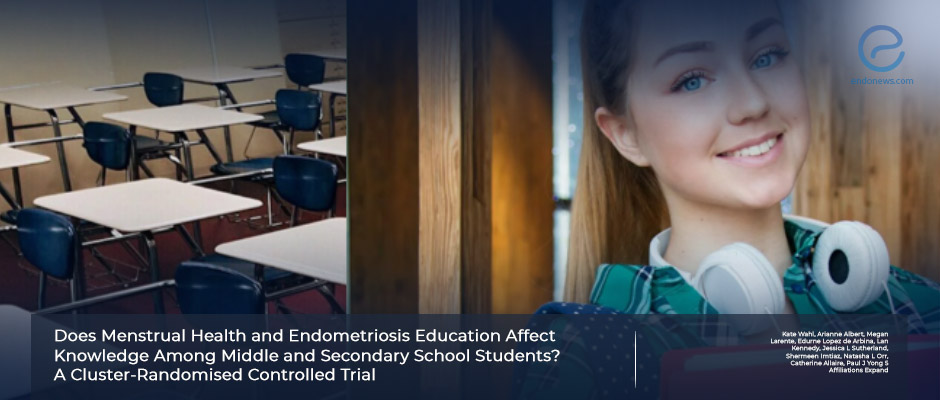Menstrual Health & Endometriosis Education Increases the Awareness in Students
Aug 23, 2024
Attitudes regarding menstrual health and endometriosis can be improved with education among adolescents.
Key Points
Highlights:
- Education programs including menstrual health and endometriosis are essential to provide confidence in endometriosis knowledge, prioritization of menstrual health knowledge, and comfort in discussing menstrual health.
Importance:
- Adolescents are an important part of society whose awareness can be increased by providing education about menstrual health and endometriosis.
What’s done here?
- This cluster-randomized, waitlist-controlled, parallel-group trial assessed how education about menstrual health and endometriosis will increase adolescent knowledge on the subject.
- Four grade 8-12 classes enrolled for the study were randomized into the intervention and control groups.
- The primary outcome was menstrual health and endometriosis knowledge; the secondary outcome was confidence in endometriosis knowledge.
- These outcomes were determined at baseline and follow-up using a 6-item questionnaire.
- The acceptability of the education program was also questioned using an 8-item questionnaire.
Key results:
- A total of 48 participants who met the eligibility criteria were included.
- The intervention classes were younger, fewer were menstruating, and of menstruating participants more experienced menstrual disturbance.
- The knowledge score about menstrual health and endometriosis following education increased by 1.86 points and 0.30 points in the intervention and the control classes, respectively.
- Confidence in endometriosis knowledge, prioritization of menstrual health knowledge, and comfort in discussing menstrual health were improved in the intervention classes.
Strengths and Limitations
- The design and inclusion of the students with diverse genders-ethnicities, menarchal age, and virtual delivery are the strengths.
- The small sample size, inclusion of the participants from only one school district, and non-generalizability of the results to the whole population, absence of follow-up are limitations of the study.
Lay Summary
The main symptoms of endometriosis include dysmenorrhea, dyspareunia, and chronic pelvic pain that may result in social and developmental disturbances such as abstinence from school or work.
There is a significant diagnostic delay of endometriosis diagnosis, because symptoms may be ignored by both patients and clinicians.
A group of researchers led by Dr.Yong, from Canada, published a study titled “Does Menstrual Health and Endometriosis Education Affect Knowledge Among Middle and Secondary School Students? A Cluster-Randomised Controlled Trial” in Journal of Obstetrics and Gynaecology Canada. The authors aimed to assess how education about menstrual health and endometriosis will increase knowledge among middle and secondary school students.
Menstrual health and endometriosis knowledge and confidence were evaluated at baseline and follow-up. The acceptability of the menstrual health and endometriosis education program was also questioned using an 8-item questionnaire.
The knowledge score about menstrual health and endometriosis following education increased in the intervention group compared to the control group. Confidence in endometriosis knowledge, prioritization of menstrual health knowledge, and comfort in discussing menstrual health were improved in the intervention classes. The mean acceptability index was higher in the intervention classes.
“The contributions of our study are to highlight the neglect of chronic diseases like endometriosis in reproductive and sexual health education despite the significant individual burden and societal cost and demonstrate that teaching menstrual health positively affects menstrual health knowledge and prioritization.” the authors added.
Research Source: https://pubmed.ncbi.nlm.nih.gov/38871121/
endometriosis menstrual health adolescents education knowledge confidence

